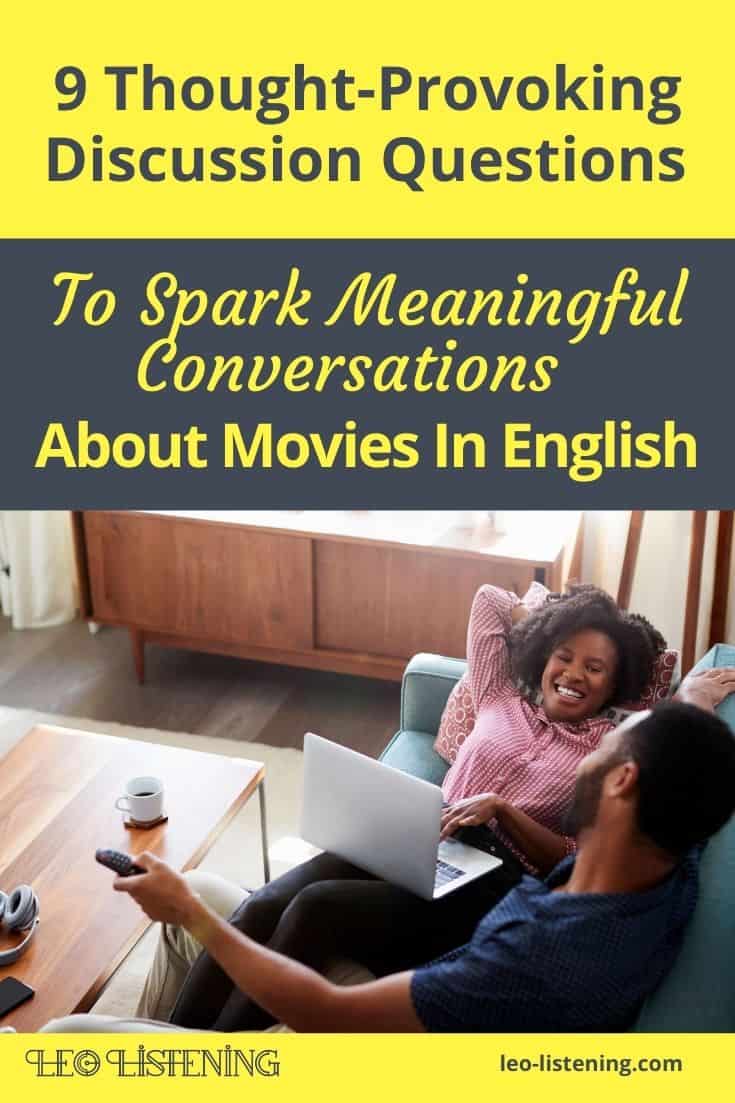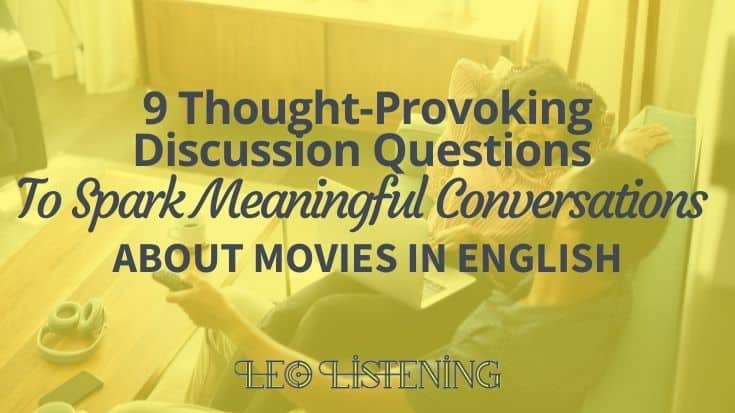“So, did you like the movie?”
“Yes”
[pause]
“So, shall we go get a drink or something…?”
Have you ever had a conversation like that one after coming out of the cinema?
Movies immerse you into the authentic language and culture of English-speaking countries. But, to get the most from watching films, and to connect in English with others, you need to talk about what you watch.
If you want to have deep discussions, you’ll need some thought-provoking discussion questions, like the ones you’ll discover in this post. No more asking yes-no questions and then running out of things to say.
You can use these questions by yourself. For example, you can write about them in your journal. Or you could record yourself answering them in the dictation app on your smartphone.
Otherwise, you could chat with a teacher or classmate about them to practise your English conversation skills.
You’ll find questions to make you think as well as questions to help you develop your English. So let’s get into it so you can start having meaningful discussions in English about the films you’re watching.
#1 How would you describe the main character and/or your favourite character(s)? And how does this compare with others people’s descriptions?
This is a great question to help you practice using the language of descriptions. But I encourage you to go a lot deeper that a physical description of the character.
You can describe how they move, how they interact with others, their personality, their fears, their deepest desires. Try to describe this person and their motivations in as much detail as possible.
Getting under the character’s skin is a great way to understand them better and develop empathy for them, even if you have a hard time understanding some their behaviour.
You can also compare your description of this character with other people for an insightful discussion.
- Do they see this character in the same way? As a victim, a bully, someone misunderstood, someone complicated etc.
- Or do they have a completely different interpretation of this person?
#2 If you could speak to the screenwriter/director, what would you ask?
What questions do you have about the screenplay, the story, the characters and other choices the screenwriter and director made?
- Are there sections of the movie you would remove? Are there parts you would add?
- Did you not understand a part of the movie, like the ending?
- Are there characters you felt deserved more screen time? Or less?
Think of all the things that bothered you about the movie. And maybe some things you liked. And then decide what questions you would ask.
Even if you probably won’t be able to speak to the screenwriter or director, you could try to imagine their response.
Or, you can turn this into a listening or reading activity. You could look for interviews with the director on YouTube, on podcasts or in movie magazines or websites.
Perhaps you’ll find answers to your questions there. Perhaps journalists and movie fans have also asked similar questions. Or completely different ones. In any case, you’ll get a new perspective on the film this way.
#3 What are the themes of this movie?
So here you’re going deeper than the story of the movie. You want to dig deep into the big themes and also the sub themes of the movie. When you take a step back, ask yourself – what is this movie asking us to explore about the human condition?
As part of Movie Club, we watched the 2009 Clint Eastwood Movie “Gran Torino”. One of the big themes of this movie is racism.
But another thread running through the film is masculinity.
- What does it mean to be a man?
- Which “men” in the movie are considered not masculine enough and why?
- Who defines masculinity in this Detroit neighbourhood where demographics are changing?
It can be interesting to explore the various themes and how they interact with each other. You can also compare this movie with others that explore the same themes. How are they similar or different? What is their particular approach to the theme? Which movie deals with it better? And why?
#4 What’s the message of the movie?
Again, to answer this question, you’ll need to go deeper than summarising the story or describing the movie. What did this movie leave you with? What is the message about the human condition that it touches on?
There is no one right answer to this question and that’s what makes it excellent for sparking discussion.
Other people may have different interpretations and that’s something you can discuss. There may also be multiple messages that this movie sends and people might classify them differently too.
Once again, you can compare movies with a similar message and look at how the approach it in similar or different ways.

#5 How did this movie make you feel?
This can help with some of the other questions as we can’t always explain our analysis with reasoning or logic. Often it comes down to what this movie made us feel – moved, frustrated, humbled, scared, confused, angry, outraged, delighted, surprised and more.
- So how did you feel as you watched it?
- What about afterwards?
- Did you expect to feel a certain way? If so, did your expectations and your actual feelings match up or not?
- How do your feelings compare with those of others? Did they feel them same way? Were you surprised but how the movie made them feel?
#6 What star rating would you give this movie? What review would you write? How does this compare with other published reviews?
This is a great question to play with if you’re working on your own and practising your writing skills. You can decide on your own rating and write a short review and then check out the reviews of fans and critics on sites like IMDb or Rotten Tomatoes.
Were the reviews of the movie generally positive or negative? What about at the time compared to now? Some movies are misunderstood on their release, but then become classics in the years that follow as new audiences discover them.
Here are a couple of examples:
Blade Runner didn’t do well on its release in 1982 and the critics disagreed about it. But in the years that followed it became a cult classic. And it’s now regarded as one of the greatest science fiction films of all time.
The Princess Bride was well-received by critics on its release, but didn’t do so well in cinemas. Again, over time, it became a cult classic.
#7 Which character did you identify with the most/the least? Why?
This is another great question to ask a group or a partner. It can be interesting to see how people’s background, culture, assumptions, preferences affect their answers.
It’s no doubt easier to identify with a character that resembles you in some way. It might be easier for you to relate to the characters if people from your background have a lot of representation on screen (white, male, young etc).
If the movie is set in a different time and place, then it might be trickier to relate to the characters when we look at them through a modern lens. But some themes, characters, experiences, transcend time and space.
#8 Has this movie aged well? Would it get made today?
We live in rapidly changing times. And our societies are going through a reckoning to do with sexism, racism, ableism, fatphobia, homophobia and transphobia.
You may have noticed that even certain recent movies and TV series are out of step with some of these rapidly changing attitudes.
We watched “Love Actually” as part of the Movie Club and we were shocked by the casual fat-shaming of one of the characters, as well as many other problems.
The messages of certain movies may be timeless. But even so, the films may be in need of an update. We have watched some beautiful period dramas recently, but these movies are very white.
Now, you may argue that this is an issue of historical accuracy. Yet, Netflix period drama hit Bridgerton is set in the early 1800s, but in an alternate history where London is racially intergrated. That means they were able to cast black actor Regé Jean-Page to play Simon Bassett, Duke of Hastings.
#9 Did anything in this movie remind you of something that has happened in your own life or in the lives of others?
Movie are supposed to be fiction, but sometimes as we say “the truth is stranger than fiction”. Perhaps you relate well to a particular film because you’ve been through something similar in your life. In which case, did the movie do a good job of conveying that experience? Why or why not?
Sometimes though, even if we’ve never experienced the same things as the characters, a good movie draws us in. And good character develop enables us to empathise with them, and feel with them. Which is why we end up experiencing the same emotions as the characters when we watch!

Great post Cara! Watching movies and TV shows became one of my favorite things to do during the pandemic. Your post reminded me of my conversations with my wife about the movies we watch. I always like to trigger conversations with one question:
-What would you do if you were [a character from the movie] when [A specific event of the movie] happened?
I know it’s a little lame, but I think it’s fun when you imagine yourself being the hero or the villain of the movie lol.
Besides, it’s amazing to see how a single question can trigger long conversations, we’ve even talked about deep matters after movies.
That’s such a great question Diego, I’ll have to add it to the list. Thanks! Almost all we talk about are deep subjects after watching the movie, even if the movie itself wasn’t necessarily serious. An example – fat shaming in “Love Actually”!
Yep, that’s the way to enjoy a movie, a good conversation afterward, instead of passively watching it and then forget about it.
Absolutely. I watched mamma mia 2 last night, and I felt it hit me harder than it did the first time I watched it. I think being able to discuss a movie after watching it is a good thing rather than just passively watching it.
In the movie Possession starring Sarah Gellar made 2008. Did the brothers have matching tatoos